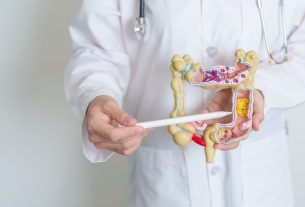Ulcerative colitis is an inflammatory bowel disease that causes inflammation and ulceration of the colon wall, causing symptoms such as bloody diarrhea, urgent urge to have a bowel movement, abdominal pain, weight loss and fever.
The exact cause of inflammation is not yet known, however, it is known that it is more common in people who consume a lot of fatty foods or who have a family history of ulcerative colitis. Learn about other types of colitis.
If ulcerative colitis is suspected, it is recommended to consult a gastroenterologist. Treatment typically involves anti-inflammatory, immunosuppressant or biologic medications and, in the most severe cases, surgery to remove the diseased colon.

Main symptoms
The main causes of ulcerative colitis are:
- Diarrhea or constipation;
- Blood in the stool;
- Urgent and/or frequent urge to evacuate;
- Abdominal pain;
- Feeling of uneasiness;
- Weight loss;
- Fever above 37.2ºC.
The symptoms of ulcerative colitis tend to vary in intensity over time, and there may be periods of improvement and worsening. However, especially at the beginning, it is common for few symptoms to appear.
Some people with ulcerative colitis may also experience other less common symptoms such as redness and/or pain in the eyes, or joint pain, which may already be present before the more common gastrointestinal symptoms.
Online symptom test
Ulcerative colitis is a type of inflammatory bowel disease. To find out the chances of having an inflammatory bowel disease, indicate the symptoms you present:
This test is only a guidance tool and is not intended to provide a diagnosis or replace consultation with a gastroenterologist or general practitioner.
How to confirm the diagnosis
The diagnosis of ulcerative colitis is made by a gastroenterologist or general practitioner based on the symptoms and results of tests, such as colonoscopy and biopsy of the intestinal wall, which identify colon inflammation. See what a colonoscopy is for and how it is done.
If you want to make an appointment, you can find the gastroenterologist closest to you using the tool below:
Taking care of your health has never been easier!
In addition, it is common for the doctor to also recommend other tests, such as blood count, blood PCR measurement and stool tests to rule out other diseases, especially intestinal infections, which can cause similar symptoms.
Possible causes
Although an exact cause of ulcerative colitis is not known, it is believed to be caused by a dysregulation of the immune system, especially in people with a genetic predisposition.
Furthermore, ulcerative colitis is more common in people aged between 15 and 30 years or over 60 years of age who consume a lot of fatty foods and have a family history of the disease, for example.
How the treatment is carried out
Treatment for ulcerative colitis can be done with specific anti-inflammatory medications orally, in the form of suppositories and/or enemas to reduce inflammation and control symptoms.
Especially in cases where there was no good response to initial treatment, the doctor may recommend the use of corticosteroids orally or rectally to control inflammation. However, these medications should not normally be used for long periods.
In more serious cases, immunosuppressive medications, such as azathioprine, or biological drugs, such as infliximab or adalimumab, may be indicated. Additionally, surgery to remove the diseased colon may also be indicated for some people.
Ulcerative colitis diet
Some people with ulcerative colitis develop lactose intolerance, and dietary changes are recommended, such as avoiding foods containing milk or dairy products, so that symptoms do not worsen. Know what to eat in case of ulcerative colitis.
Bibliography
- KOBAYASHI, Taku et al. Ulcerative colitis. Nat Rev Dis Primers. Vol.6, n.1. 74, 2020
- CLEVELAND CLINIC. Ulcerative Colitis. Disponível em: <https://my.clevelandclinic.org/health/diseases/10351-ulcerative-colitis>. Acesso em 19 set 2023
- STATPEARLS. Ulcerative Colitis. 2023. Available at: <https://www.ncbi.nlm.nih.gov/books/NBK459282/>. Accessed on September 19, 2023
- UNGARO, Ryan et al. Ulcerative colitis. Lancet. Vol.389, n.10080. 1756-1770, 2017
- KUCHARZIK, Torsten et al. Ulcerative Colitis-Diagnostic and Therapeutic Algorithms. Dtsch Ärztebl Int. Vol.117, n.33-34. 564-574, 2020
- YOU, Lillian; Hah, Christina. Epidemiology and Pathogenesis of Ulcerative Colitis. Gastroenterol Clin North Am. Vol.49, n.4. 643-654, 2020

Sign up for our newsletter and stay up to date with exclusive news
that can transform your routine!
Warning: Undefined array key "title" in /home/storelat/public_html/wp-content/plugins/link-whisper-premium/templates/frontend/related-posts.php on line 12
Warning: Undefined array key "title_tag" in /home/storelat/public_html/wp-content/plugins/link-whisper-premium/templates/frontend/related-posts.php on line 13



